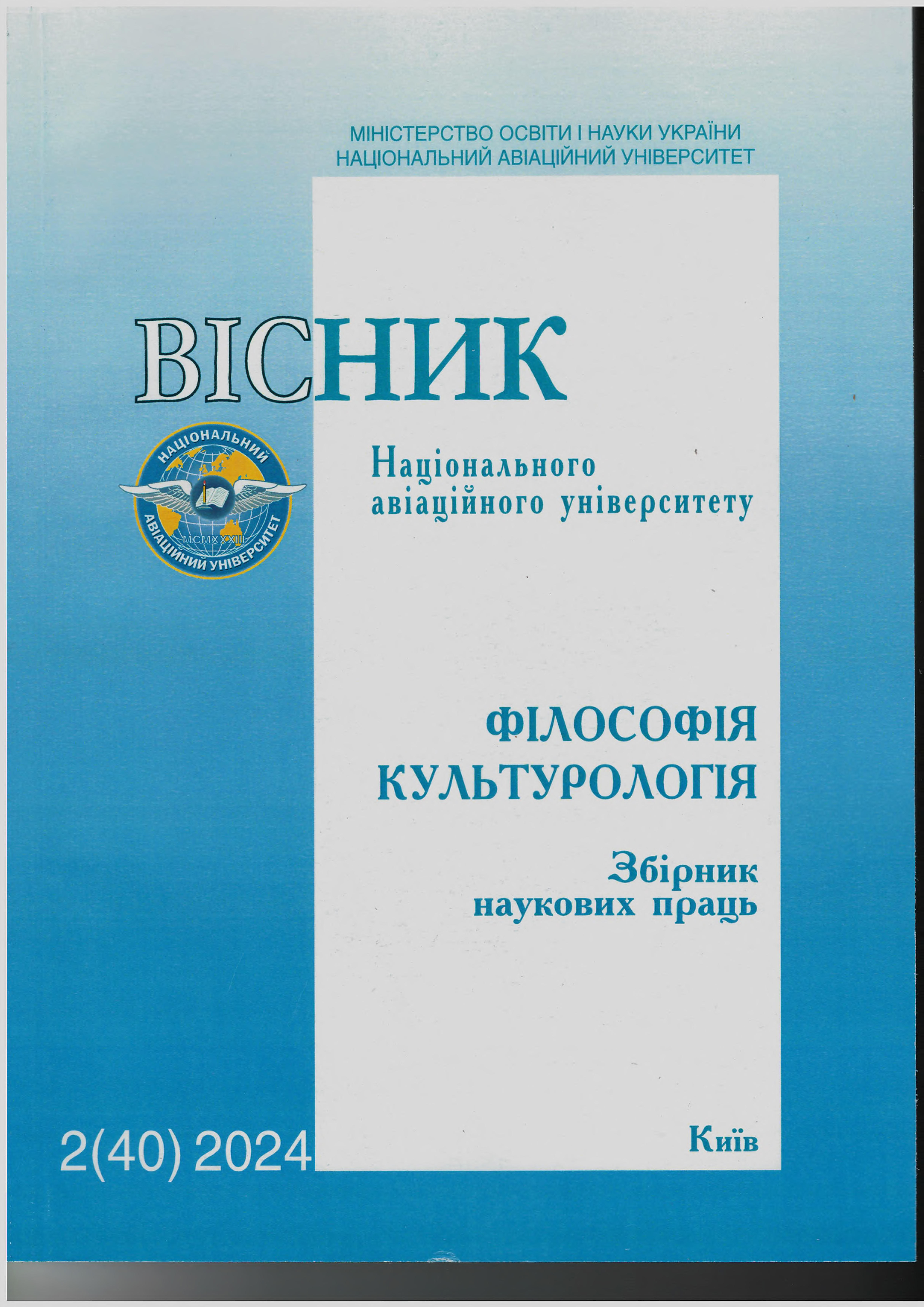ANTHROPOLOGICAL FOUNDATIONS OF TOLERANCE IN COMMUNICATION: CHALLENGES AND PROSPECTS IN CONTEMPORARY SOCIETY
DOI:
https://doi.org/10.18372/2412-2157.40.19316Keywords:
tolerance, communication, cultural relativism, rituals, civil society, social institutions, dialogueAbstract
Growing social tensions driven by ethnic, cultural, and political conflicts underscore the need to study tolerance as a stabilizing principle. The aim is to explore the anthropological grounds of tolerance in contemporary communicative practices. The tasks are to identify the specificity of the philosophical-anthropological understanding of the problem of tolerance; to explore the forms of tolerant communication in the context of the information society. Research methods includes historical-philosophical, comparative, sociocultural, social-psychological, and anthropological approaches. Research results. The concept of tolerance has evolved from ancient notions of endurance to ideas that interpret it as the foundation of civil peace, freedom of belief, and diversity recognition. Anthropologists emphasize its ritualistic basis as a means of avoiding conflict and fostering trust. Modern concepts view tolerance as a mechanism for integrating diversity to ensure social stability. In the digital age, tolerance takes new forms, becoming a tool for inclusion through education, media literacy, and civic initiatives. Discussion. The accelerated and fragmented nature of contemporary communication hampers reflection and weakens tolerance, which requires time and openness to engage with others. Conclusions. The evolution of the concept of tolerance reveals its application to phenomena ranging from compromise to active respect for diversity. The anthropological foundations of tolerance lie in the ability to ensure stable interactions between individuals and groups, grounded in the acceptance of diversity, equality, and openness to dialogue. Ritualized communication can either strengthen or weaken tolerance, depending on linguistic choices and context, while providing space for cultural integration. Cultural relativism aids in adapting tolerance to multicultural environments by overcoming ethnocentrism and promoting mutual respect. In the digital era, tolerance functions as a strategy for inclusion, with digital rituals offering new pathways for cultural integration and global stability
References
An Initiative of the United Nations. Global Forum on Migration and Development : [site]. URL: https://www.gfmd.org.
An International UNESCO Initiative. Education Above All : [site]. URL: http://surl.li/slxkcf.
Boas F. Race, Language, and Culture. Chicago : University of Chicago Press, 1982. 647 p. URL: http://surl.li/pvrvwm.
Coalition building for tolerance and non-discrimination: a practical guide / OSCE Office for Democratic Institutions and Human Rights. Warsaw : Organization for Security and Co-operation in Europe, 2018. 99 p. URL: https://www.osce.org/odihr.
Declaration of principles on tolerance: adopted by the General Conference of UNESCO at its twenty-eighth session, Paris, 16 November 1995. UNESCO : [site]. URL: https://unesdoc.unesco.org.
Kant I. Religion within the Boundaries of Mere Reason / trans. by A. Wood, G. Di Giovanni. Cambridge : Cambridge University Press, 2018. URL: http://surl.li/bwbsdt.
Kymlicka W. Multicultural Citizenship: A Liberal Theory of Minority Rights. Oxford : Clarendon Press, 1995. 296 p.
Learning to Live Together. UNESCO : [site]. URL: http://surl.li/egypnr.
Locke J. A Letter Concerning Toleration and Other Writings / ed. M. Goldie. Indianapolis : Liberty Fund, 2010. URL: https://oll.libertyfund.org/title/2375.
Malinowski B. A Scientific Theory of Culture and Other Essays. New York : Oxford University Press, 1961. 228 p.
Marcuse H. Repressive Tolerance. The Collected Papers of Herbert Marcuse. 2014. Vol. 5. P. 82–117.
No Hate Speech Movement. Council of Europe : [site]. URL: http://surl.li/yzzoze.
Popper K. The Open Society and Its Enemies. Princeton : Princeton University Press, 2013. 808 p.
Voltaire. Treatise on Tolerance / trans. by J. Bennett. Indianapolis : Liberty Fund, 2017. URL: https://example-link.org.
Модель компетентностей для демократичної культури Ради Європи. Living Democracy : [сайт]. URL: http://surl.li/ jckmeb.
Рекомендація № 10. Як запобігати мові ненависті проти захищених груп та протидіяти їй у публічній комунікації. МедіаРада : [сайт]. URL: http://surl.li/vqofao.
Руссо Ж.-Ж. Про суспільну угоду, або принципи політичного права / пер. з фр. О. Хома. Київ : Port-Royal, 2001. 346 с. (Серія «Філософські першоджерела»).
Руанда. 30 років після геноциду: Церква будує примирення і єдність народу. CREDO : [сайт]. URL: https://credo.pro/2024/04/365095.
Уолцер М. Про толерантність / пер. М. Лупішко. Харків : РА-Каравела, 2003. 148 с. URL: http://surl.li/zwbvda.
ЮНЕСКО визначила п’ять принципів медійної та інформаційної грамотності. Укрінформ : [сайт]. URL: http://surl.li/nxujrf.


